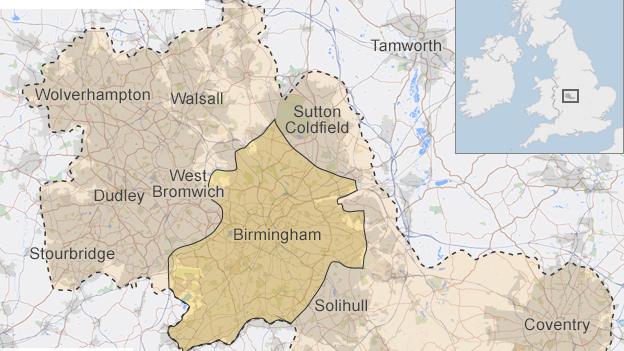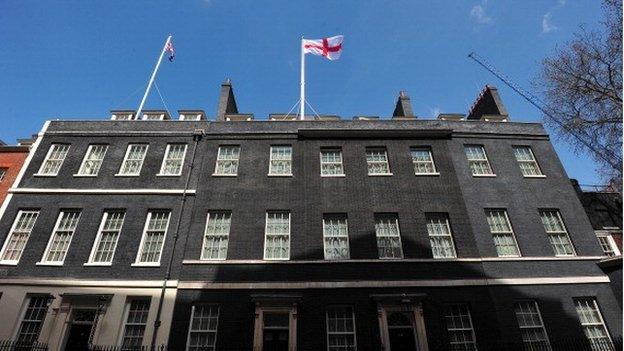West Midlands devolution hitting a 'log jam'
- Published
- comments

How the combined authority, whatever it will be called, could be formed
For supporters of local devolution, who have spent years campaigning for our politics to be decentralised, Christmas came early.
In November, the Labour leader of Sandwell Council Darren Cooper proclaimed he had negotiated a "historic agreement".
His was one of four Black Country councils which had agreed with traditional rival Birmingham to work towards a combined West Midlands authority aimed at forging an even bigger "economic powerhouse" than the much-vaunted one in the north.
My post of 10 December explained how Coventry faced a decision whether it should take part too, to give the project the critical mass envisaged by Mr Cooper.
Solihull, too, could have a pivotal role in all this.
How credible would a West Midlands authority appear if it did not include the borough which is home to the National Exhibition Centre, the international airport, the Land Rover plant and a potential high-speed rail station?
Reality check
I mentioned Solihull's Conservative Council leader Bob Sleigh, though "cautious" about the enterprise, had agreed to join the working group looking into it.
And now, with the Christmas decorations packed away for another year, come the dark days of January and a reality-check.
The head of the government's review of governance in Birmingham, Sir Bob Kerslake, has upped the ante by telling the council to press ahead with the project.

Devolution is likely to cut across traditional county boundaries
The city's Labour leader, Cllr Sir Albert Bore, however, told a recent meeting of the governance scrutiny committee that much as he wanted to proceed quickly, Solihull was a potential "log jam".
"A combined authority which does not include Solihull would not be effective because they are part of the West Midlands economic geography, the travel to work area," he said.
Solihull's reluctance to rush headlong into any quick decisions is understandable.
Leaders of the only Conservative council engaged in this debate have long experience of the general concern in the town that it would have more to lose than most were local assets to be pooled into some sort of wider identity.
'Lost cities'
This debate has been dominated so far by the great conurbations and the major cities which, in many ways, define them.
But from the Birmingham-based research organisation Public Service Intelligence comes a further word of caution. PSIN's Devo City report, external highlights what it sees as a serious contradiction at the heart of this whole debate.
The report states: "Ironically, given that devolution in England is being led by the needs of cities, it is the final group of 'lost cities' covering 3.5 million people with a population all below 400,000 that stand in the way of devolution for all, as they are hard to group into viable regions.

Sandwell Council Leader Darren Cooper hailed the "historic agreement" regarding a combined authority
"They include cities on the edges of counties they used to belong to."
Stoke-on-Trent and Telford & Wrekin are the ones on that list of 16 "lost cities" in our part of the country.
Telford's Labour MP David Wright told me recently that his new town, though in Shropshire, inclined economically towards the West Midlands conurbation.
The arrival of Jaguar Land Rover's giant engine plant just down the M54 outside Wolverhampton can be expected to strengthen that gravitational pull still further.
Stoke-on-Trent City Council, meanwhile, is an all-purpose authority surrounded by Staffordshire, a sort of unitary island in a county sea. So should it be returned to its former territorial waters?
City alliances
The Devo City report uses this same analogy to suggest a different vision altogether.
"The remaining lost cities could join with peers in city alliances. Some would be geographically close... such as a North Mercian city alliance of Stoke-on-Trent, Telford & Wrekin and Warrington."
Not only would this cut across the traditional county boundaries of Staffordshire, Shropshire and Cheshire, it would also blur the edge between the Midlands and the North West.
This would be bound to prompt yet more arguments about local democratic identities.

Some 1,400 jobs are expected to be created at jaguar Land Rover's i54 plant
By now you will have gathered that however much political leaders from David Cameron and Nick Clegg to Darren Cooper may want a prompt response, the reality is more likely to be the sort of long-drawn-out process foreshadowed by Sir Albert Bore.
And we will be making our own contribution to the debate in this weekend's Sunday Politics.
Joining me in the studio will be the author of that Devo City report, Steve Mathieson, Director of Public Service Intelligence.
Also with us will be two MPs closely involved in this conversation - Gavin Williamson and Gisela Stuart.
Conservative MP for Staffordshire South, Gavin Williamson is David Cameron's Parliamentary Private Secretary and his constituency includes the i54 business park, home to that Jaguar Land Rover engine plant.
Gisela Stuart, Labour MP for Birmingham Edgbaston, has long championed the decentralisation of politics, especially in pursuit of economic growth, better skills and more jobs.
And I hope you will join us too, at our usual time of 11.00 this Sunday 18 January on BBC One in the West Midlands.
- Published3 December 2014
- Published12 November 2014
- Published7 November 2014

- Published7 November 2014
- Published6 November 2014

- Published14 October 2014
